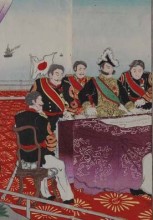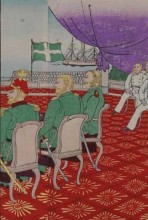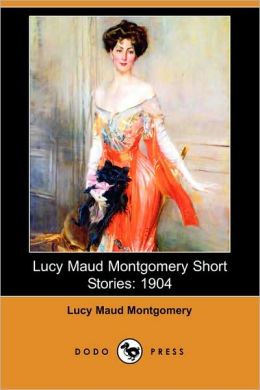The Tale of Benjamin Bunny. Beatrix Potter. 1904. [Source: Bought]
First sentence: One morning a little rabbit sat on a bank. He pricked his ears and listened to the trit-trot, trit-trot of a pony.
Premise/plot: Benjamin Bunny is a cousin--and friend--to Peter Rabbit. When he sees Mr. and Mrs. McGregor leaving the farm for the day, he rushes over to Peter's house and suggests something daring: go back to Mr. McGregor's garden to GET PETER's JACKET BACK. Peter agrees, though slightly reluctantly. He's had a traumatic experience, after all, but he's not that timid a rabbit. Another adventure will be had!!!
My thoughts: Really love both of these stories. I do. I like both Peter Rabbit and Benjamin Bunny as characters. And I like their adventures. They may be naughty--sometimes VERY naughty--but there isn't ever a dull moment either. And it's quite something to see OLD MR. BUNNY (aka Benjamin's dad) take care of the cat!!!
Text: 5 out of 5
Illustrations: 5 out of 5
Total: 10 out of 10
© 2015 Becky Laney of
Becky's Book Reviews
L.M. Montgomery Short Stories, 1904. L.M. Montgomery. Dodo Press. 144 pages.
This is the third L.M. Montgomery short story collection I've read and reviewed this month. (The first covering
1896-1901; the second covering
1902-1903.) This collection features eighteen short stories: "A Fortunate Mistake," "An Unpremeditated Ceremony," "At the Bay Shore Farm," "Elizabeth's Child," "Freda's Adopted Grave," "How Don Was Saved," "Miss Madeline's Proposal," "Miss Sally's Company," "Mrs. March's Revenge," "Nan," "Natty of Blue Point," "Penelope's Party Waist," "The Girl and the Wild Race," "The Promise of Lucy Ellen," "The Pursuit of the Ideal," "The Softening of Miss Cynthia," "Them Notorious Pigs," and "Why Not Ask Miss Price?"
It is always interesting to read her short stories. I noticed in this collection in particular that there were several ideas or themes that were later developed more fully and used in several of her novels. For example, "The Promise of Lucy Ellen," reminded me of the West sisters in Rainbow Valley. And "Miss Sally's Company" reminded me of Miss Lavendar from Anne of Avonlea.
The story I loved MOST of all is "
Them Notorious Pigs." Here is how it begins:
John Harrington was a woman-hater, or thought that he was, which amounts to the same thing. He was forty-five and, having been handsome in his youth, was a fine-looking man still. He had a remarkably good farm and was a remarkably good farmer. He also had a garden which was the pride and delight of his heart or, at least, it was before Mrs. Hayden's pigs got into it.
Mrs. Hayden is a widow raising two young children and struggling to keep up with her new farm. After the pigs get into Mr. Harrington's garden one too many times...he loses it...
Harrington had never seen his neighbour at close quarters before. Now he could not help seeing that she was a very pretty little woman, with wistful, dark blue eyes and an appealing expression. Mary Hayden had been next to a beauty in her girlhood, and she had a good deal of her bloom left yet, although hard work and worry were doing their best to rob her of it. But John Harrington was an angry man and did not care whether the woman in question was pretty or not. Her pigs had rooted up his garden—that fact filled his mind.
"Mrs. Hayden, those pigs of yours have been in my garden again. I simply can't put up with this any longer. Why in the name of reason don't you look after your animals better? If I find them in again I'll set my dog on them, I give you fair warning."
A faint colour had crept into Mary Hayden's soft, milky-white cheeks during this tirade, and her voice trembled as she said, "I'm very sorry, Mr. Harrington. I suppose Bobbles forgot to shut the gate of their pen again this morning. He is so forgetful."
"I'd lengthen his memory, then, if I were you," returned Harrington grimly, supposing that Bobbles was the hired man. "I'm not going to have my garden ruined just because he happens to be forgetful. I am speaking my mind plainly, madam. If you can't keep your stock from being a nuisance to other people you ought not to try to run a farm at all."
Then did Mrs. Hayden sit down upon the doorstep and burst into tears. Harrington felt, as Sarah King would have expressed it, "every which way at once." Here was a nice mess! What a nuisance women were—worse than the pigs!
"Oh, don't cry, Mrs. Hayden," he said awkwardly. "I didn't mean—well, I suppose I spoke too strongly. Of course I know you didn't mean to let the pigs in. There, do stop crying! I beg your pardon if I've hurt your feelings."
"Oh, it isn't that," sobbed Mrs. Hayden, wiping away her tears. "It's only—I've tried so hard—and everything seems to go wrong. I make such mistakes. As for your garden, sir. I'll pay for the damage my pigs have done if you'll let me know what it comes to."
She sobbed again and caught her breath like a grieved child. Harrington felt like a brute. He had a queer notion that if he put his arm around her and told her not to worry over things women were not created to attend to he would be expressing his feelings better than in any other way. But of course he couldn't do that. Instead, he muttered that the damage didn't amount to much after all, and he hoped she wouldn't mind what he said, and then he got himself away and strode through the orchard like a man in a desperate hurry.
Something changed after their meeting...Mr. Harrington finds himself wishing that those pigs would get in again...because he would LOVE to see her again...
I also LOVED
The Girl and the Wild Race. Mrs. Theodora Whitney desperately wants Judith to get married. (She is twenty-seven after all.) Mrs. Whitney feels that Eben King would be the perfect match for Judith. He is her choice for Judith. But Eben King is NOT Judith's ideal. Judith thinks Bruce Marshall is her "right one." When Judith overhears her aunt talking to a notorious gossiper about how horribly contrary she is and how she's unlikely to ever marry...she reacts.
"I will," repeated Judith stormily. "I'm tired of being nagged day in and day out. I'll marry—and what is more I'll marry the very first man that asks me—that I will, if it is old Widower Delane himself! How does that suit you, Aunt Theodora?"
Mrs. Theodora's mental processes were never slow. She dropped her knitting ball and stooped for it. In that time she had decided what to do. She knew that Judith would stick to her word, Stewart-like, and she must trim her sails to catch this new wind.
"It suits me real well, Judith," she said calmly, "you can marry the first man that asks you and I'll say no word to hinder."
The color went out of Judith's face, leaving it pale as ashes. Her hasty assertion had no sooner been uttered than it was repented of, but she must stand by it now. She went out of the kitchen without another glance at her aunt or the delighted Mrs. Tony and dashed up the stairs to her own little room which looked out over the whole of Ramble Valley. It was warm with the March sunshine and the leafless boughs of the creeper that covered the end of the house were tapping a gay tattoo on the window panes to the music of the wind.
Which suitor will arrive first when he hears the news of Judith's bold declaration? It WILL lead to quite a race!
© 2013 Becky Laney of
Becky's Book Reviews
This Day in World History
February 8, 1904
Japanese Attack Port Arthur, Starting Russo-Japanese War
 On February 8, 1904, just before midnight, Japanese destroyers entered the harbor of Port Arthur (now Lü-shun, China). Soon after, they unleashed torpedoes against Russian ships in a surprise attack that began the Russo-Japanese War.
On February 8, 1904, just before midnight, Japanese destroyers entered the harbor of Port Arthur (now Lü-shun, China). Soon after, they unleashed torpedoes against Russian ships in a surprise attack that began the Russo-Japanese War.
The conflict grew over competition between Russia and Japan for territory in both Korea and Manchuria, in northern China. Japan had won Port Arthur, at the tip of the Liaotung Peninsula, from China in an 1894–1895 war. Russia joined with other European powers to force it to relinquish the port, however — and then three years later had compelled China to grant the city to it. These actions rankled Japan, as did Russia’s refusal to honor a promise to withdraw troops from Manchuria. Japan decided to go to war.
The attack on Port Arthur resumed in the late morning of February 9, when bigger Japanese ships began shelling the Russian fleet and nearby forts. The Russians put up more resistance than expected, however, and the Japanese ships withdrew.
 The attack on Port Arthur was inconclusive, but the rest of the war went largely Japan’s way. The Japanese enjoyed several victories in 1904, seizing Korea in March, and defeating Russian forces twice in Manchuria during the summer. More success followed in 1905, with the surrender of Port Arthur in January, a victory over a large Russian army in Manchuria in March, and a decisive naval battle at Tsushima Strait in May that destroyed the Russian fleet. Russia’s government, facing unrest at home, was forced to seek peace.
The attack on Port Arthur was inconclusive, but the rest of the war went largely Japan’s way. The Japanese enjoyed several victories in 1904, seizing Korea in March, and defeating Russian forces twice in Manchuria during the summer. More success followed in 1905, with the surrender of Port Arthur in January, a victory over a large Russian army in Manchuria in March, and a decisive naval battle at Tsushima Strait in May that destroyed the Russian fleet. Russia’s government, facing unrest at home, was forced to seek peace.
The Russo-Japanese War marked the first victory of a non-European nation against a European one in modern times. It also contributed to unrest in Russia that would lead, more than a decade later, to the Russian Revolution.
“This Day in World History” is brought to you by USA Higher Education.
You can subscribe to these posts via RSS or receive them by email.



The Phoenix and the Carpet. E. Nesbit. 1904. 224 pages.
It began with the day when it was almost the Fifth of November, and a doubt arose in some breast--Robert's, I fancy--as to the quality of the fireworks laid in for the Guy Fawkes celebration.
The Phoenix and the Carpet is the sequel to Five Children and It. It stars Robert, Anthea, Jane, Cyril, and Lamb. (Though Lamb isn't a big star in the novel, he does manage to steal a few scenes in this one!) If you thought the magical adventures for these children were over--now that they've returned to the city and are far from their Psammead--you'd be wrong. (The Psammead is the "It" from the previous book.) For the delightful-sometimes-dangerous adventures are just beginning. After an "accident" in the nursery ruins the carpet, the carpet is replaced with a magical one. And this magical carpet holds another secret--for within it was an egg. Not just an ordinary egg. No, the Phoenix hatches from this egg--once another "accident" lands it in the nursery fireplace. The children now have THE Phoenix and a magic carpet--so you see the adventures are just beginning. Do you think these children are any wiser this time around? Do you think their wishes will lead them into trouble? Or into trouble that they can't think themselves out of?
Some of my favorite passages:
On this particular Sunday there were fowls for dinner, a kind of food that is generally kept for birthdays and grand occasions, and there was an angel pudding, when rice and milk and orange and write icing do their best to make you happy. (52)
and
Mother was really a great dear. She was pretty and she was loving, and most frightfully good when you were ill, and always kind, and almost always just. That is, she was just when she understood things. But of course she did not always understand things. No one understands everything, and mothers are not angels, though a good many of them come pretty near it. The children knew that mother always wanted to do what was best for them, even if she was not clever enough to know exactly what was the best. (73)
There were many things I loved about this one. I loved the trouble that comes about when the wishing carpet makes its own wish--and brings back one-hundred and ninety-nine Persian cats. Of course, that is only the start of that particular mishap...
I also LOVED Lamb's scenes in this novel. In particular when this little one crawled onto the wishing carpet and started babbling. The carpet, of course, understands all languages--even baby ones--and Lamb and the carpet vanish. This puzzles the children, how will they get their baby brother back?! How can they ever explain to their mom what happened?! I won't tell you how this one resolves, but I just loved it!
I loved this one. I don't know that I love it any more than I do Five Children and It. I just know that I love E. Nesbit. I love her narrative style. I love her descriptions. And I am so very thankful I've discovered her! And I'm looking forward to reading more of her books.
Have you read any Nesbit? Do you have a favorite book? Which do you think I should read next?
© Becky Laney of
Becky's Book Reviews









I don't usually read romances, but these stories sound like a lot of fun. Thanks for reviewing them.
I'm participating in Carrie's LM Montgomery Reading Challenge at Reading to Know. Are you? Your reviews would make a great addition! I'm not a big short story fan, but your reviews make me want to read these, and do it chronologically.
I haven't read her short stories yet, but obviously I need to!